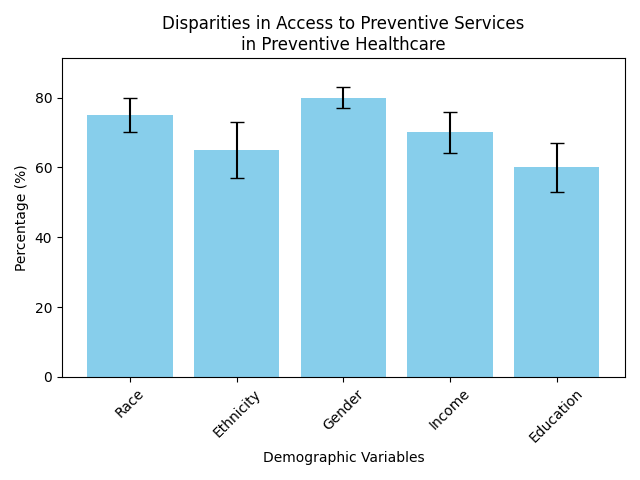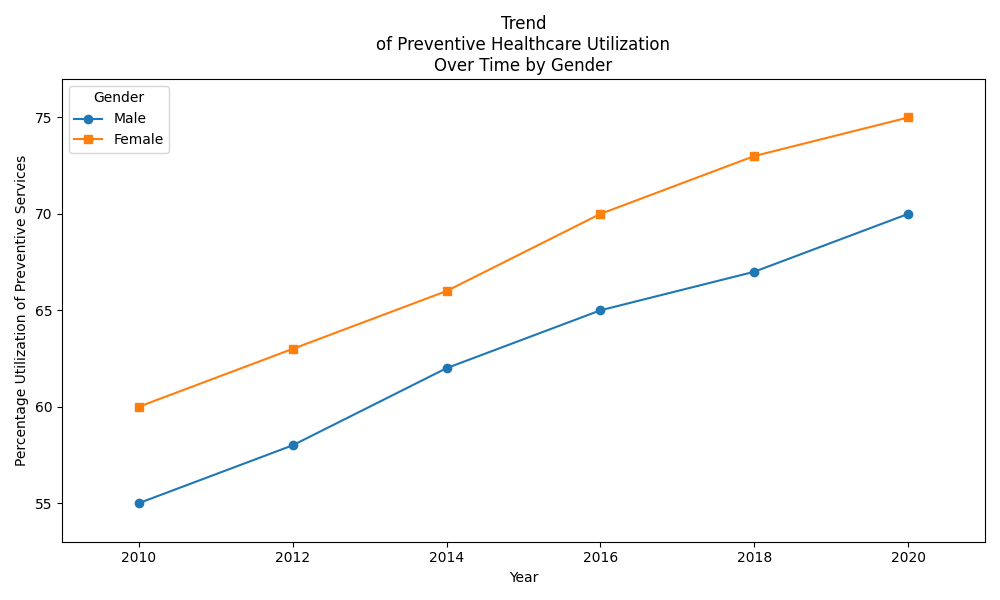Preventive Healthcare: Navigating the Path to Optimal Wellness
Key Takeaways
| Topic | Summary |
|---|---|
| Disparities in Access to Preventive Services | Highlights the existing gaps in access to preventive healthcare across different demographics. |
| Trends in Preventive Healthcare Over Time | Discusses how the utilization of preventive healthcare services has changed over time, with a focus on gender differences. |
| The Role of Screening in Preventive Health | Emphasizes the critical role of early screening in detecting and preventing health issues. |
| Know Your Family Health History as Part of Preventive Care | Underlines the importance of understanding one’s family health history as a crucial aspect of preventive healthcare. |
| The Importance of Regular Checkups in Preventive Medicine | Advocates for the significance of regular health checkups in maintaining overall health and preventing potential health problems. |
| How Preventive Services Can Improve Your Health Outcomes | Explains how engaging in preventive services can significantly improve one’s health outcomes by catching problems early. |
| Staying Up-to-Date with Preventive Health Care Services | Encourages staying informed about the latest preventive healthcare services and their benefits. |
Have you ever stopped to consider the power of prevention in healthcare? Imagine if you could stop illnesses in their tracks before they even begin to disrupt your life. That’s the beauty and the promise of preventive healthcare. It’s about taking control of your health today to avoid medical problems tomorrow. But how well are we actually doing in harnessing this potential? Let’s dive into the world of preventive healthcare and explore its benefits, challenges, and everything in between.
Understanding Disparities in Preventive Healthcare Services

When we talk about preventive healthcare, it’s crucial to recognize that not everyone has the same starting line. Various factors, including socioeconomic status, geography, race, and ethnicity, can influence one’s access to preventive services. This disparity is not just a shortfall in our healthcare system; it’s a call to action for equity and accessibility. How do we bridge this gap to ensure that preventive healthcare truly is for everyone? It requires a multifaceted approach, including policy changes, community outreach, and education efforts that encourage a culture of prevention.
Trends in Preventive Healthcare Over Time: A Closer Look

The landscape of preventive healthcare is ever-evolving. Over the years, we’ve seen shifts in how men and women utilize preventive services. From vaccinations to cancer screenings, the trajectory has been fascinating but uneven. For instance, women traditionally have been more proactive about seeking preventive care, a trend partly fueled by regular gynecological check-ups and prenatal care. But what about the men? How can we close the gender gap in preventive health, ensuring that everyone, regardless of gender, is equally invested in their health futures? Encouraging more open conversations about health, debunking stigmas, and making preventive services more accessible can play a vital role in changing these trends for the better.
The Role of Screening in Preventive Health
Preventive screening is arguably one of the most powerful tools in our healthcare arsenal. Detecting a problem early can mean the difference between a straightforward treatment and a complicated, costly intervention. From blood pressure and cholesterol tests to screenings for cancers and diabetes, these procedures are pivotal. Yet, so many people skip these screenings due to fear, misconception, or lack of access. How do we encourage a shift in mindset to see these screenings not as optional but as essential components of healthcare?
Know Your Family Health History as Part of Preventive Care
Your family tree holds more than just names; it’s a map of potential health risks and predispositions. Knowing your family health history is a cornerstone of preventive healthcare, yet it’s often overlooked. This knowledge can inform your healthcare provider about the screenings and tests that are most relevant for you. Engaging in conversations with family members and sharing this information with your doctor can be powerful steps in taking charge of your health.
The Importance of Regular Checkups in Preventive Medicine
We’ve all heard the saying, “An ounce of prevention is worth a pound of cure,” and nowhere is this truer than in regular health checkups. These visits are not just about getting shots; they’re opportunities to catch potential health issues early, discuss health goals, and receive tailored advice for maintaining a healthy lifestyle. Regular checkups are the linchpins of a strong preventive healthcare strategy. They’re your personal health tune-ups, and skipping them is akin to skipping regular maintenance on your car – eventually, something is going to break down.
How Preventive Services Can Improve Your Health Outcomes
Engaging with preventive services is more than a checkbox on your to-do list; it’s a commitment to your future self. These services, ranging from vaccinations to lifestyle counseling, are designed to catch problems early when they’re most treatable and to prevent health issues before they start. The result? Potentially better health outcomes, lower healthcare costs, and a higher quality of life. But the question remains: How do we make these services more accessible and appealing to those who need them most?
Staying Up-to-Date with Preventive Health Care Services
In an age where health information is at our fingertips, staying informed about preventive healthcare has never been easier—or more overwhelming. Navigating the sea of health advice requires discernment and a bit of skepticism about the sources. However, the payoff is unprecedented access to information that can empower you to make informed decisions about your health. It’s about being proactive, asking questions, and never settling for less when it comes to your well-being.
Related Articles
- Botox for Migraines: Your Go-To Toxin for Tranquility
- Nature’s Bounty Cranberry 4200mg With Vitamin C review
- How Long Do Migraines Last? Unravel the Attack!
- What is Preventive Medicine? | ACPM
- Preventive Health: What Is It and Why Is It Important?
- Preventive Care – Healthy People 2030
Preventive healthcare, while not a panacea, is our most potent weapon in the quest for lifelong health. In embracing a culture of prevention, from equitable access to personalized preventive services, we all play a part in crafting a future where health disparities are a thing of the past, and optimal wellness is within everyone’s reach. It’s not just about adding years to our lives but adding life to our years.
Frequently Asked Questions
Q: What is considered preventive care?
A: Preventive care includes services such as routine check-ups, screenings, and immunizations to prevent potential health problems before they arise.
Q: Why are preventive health services important?
A: Preventive health services are crucial for early detection and prevention of health conditions, leading to improved health and well-being.
Q: How often should I undergo cancer screening?
A: The frequency of cancer screening tests depends on your age, gender, and personal health history. It is best to consult with your primary care provider to determine the appropriate schedule for you.
Q: How can preventive care services help in reducing health care costs?
A: By focusing on disease prevention and health promotion, preventive care services can help identify health issues early on, leading to lower healthcare costs in the long run.
Q: What does the preventive services task force recommend?
A: The preventive services task force provides guidelines on the importance of preventive care measures, such as screenings for high blood pressure, type 2 diabetes, and cardiovascular disease.
Q: How do preventive care services contribute to overall well-being?
A: Preventive care services not only help in disease prevention but also promote health and well-being by encouraging regular care visits and health promotion activities.
